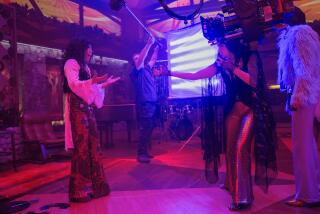In Ghana, Witch Villages Offer Safe Haven From Superstition
- Share via
GAMBAGA, Ghana — Stopping for a moment from grinding her small ration of millet, the young woman smiles nervously and says, no, she’s not sure exactly what she did to come to this place.
All she knows is a little boy died. And she was blamed. And with accusations of witchcraft seething in her village, she was attacked by former friends and neighbors.
Eventually, her family turned against her, and her husband brought her to Gambaga, a dusty town 30 miles from the nearest paved road that offers refuge to more than 100 women accused of witchcraft.
They live in a cluster of mud-walled compounds on the edge of town, hoping to reclaim someday a little piece of their lives.
“I don’t know what happened,” says the woman, who goes only by the name Banga and who now believes that she somehow did put a curse on her nephew, making him sick and finally killing him.
“Only God can tell. I don’t know how I did it,” she says.
In a country where cell phones and satellite TV mix freely with age-old beliefs in the supernatural, where everyone from Cabinet ministers to missionaries believes in witchcraft, the “witch villages” of northern Ghana have become the center of a debate over how a modern government should deal with sometimes brutal traditions.
If the witches of Gambaga live in abject poverty, forbidden from leaving without permission, their ghetto is also one of the few places where they are safe.
“If I go back I would not survive,” says one woman, Hawa, who came to Gambaga a few months ago. “The father of the baby I bewitched would hunt me down.”
For centuries, witchcraft has been used in this part of the world to explain natural phenomena, from polio to impotence. The accused often are elderly women, the weakest members of African village life. Many times it is a jealous neighbor or another wife in a polygamous household who makes the witchcraft accusation.
Women accused of sorcery have few choices but to seek protection in a witch village. There, the chief is believed to have the ability to drain a witch’s powers before shunting her off to live in the sorcerers’ ghetto, where most of the women eventually come to believe they really are witches.
Gambaga, a collection of mud-and-thatch huts and colonial-era field-stone buildings, is one of the three known witch villages remaining in Ghana. During the last century, nearly every village in the region had its own witch ghetto, but they gradually disappeared under pressure from missionaries and British colonial authorities.
Gambaga has a population of a few thousand, about 130 of them accused witches. It looks pretty much like every other town--except that the witches’ camp is spotlessly neat. “No men,” one woman explains.
The alleged witches of Gambaga, most of them in their 40s and 50s, are mostly uneducated and come from small, rural villages, where fear of witchcraft runs deepest. Many will spend decades in the camp, living there until they die.
Most are desperately poor. Although the chief offers the women protection and the eventual promise of a proper burial, he provides them with little food. Instead, they rely on charity, the sale of firewood and the food they receive from working in the chief’s fields.
Ruling over Gambaga is Chief Yahaya Wune, a sometimes benevolent autocrat with a firm belief in the righteousness of the witches’ ghetto. “It’s not by magic that I keep them,” he says through a translator. “It’s merely a tradition handed down from generation to generation to provide sanctuary.”
The witches’ ghetto stands near the humble, thatch-roofed dwelling that the chief calls his palace.
Yahaya’s rule has changed little from the days when his forefathers ran Gambaga. Here, his word is law, and he is greeted with bows and hand-clapping when he walks through town.
He becomes angry when he talks about the accusations leveled against the witch villages from hundreds of miles away in Accra, the capital.
“What crime have I committed?” he demands. “Those that actually did it--are proved to be witches--I accept,” he says. “But we settled them here to prevent them from being attacked.”
Still, after existing quietly for at least 150 years, the witch villages have become a political issue.
Government officials, rights activists and church groups decry them as inhumane prisons where elderly women languish unless the chief decides they no longer pose a threat and their home villages will take them back. Freed witches must also repay the chief for his protection, giving him a goat, some chickens and the equivalent of about $10, a sizable payment for a Ghanaian villager.
“It is obnoxious and is a violation of the rights of women,” says Ama Benyiwa-Doe, Ghana’s deputy minister of employment and social welfare, who wants to ban the villages and prosecute the chiefs.
But even critics concede that in a country where an accusation of witchcraft can be a death sentence, the witch villages provide a necessary haven.
The chief “is not a cruel man,” says the Rev. Emmanuel Arongo, the Anglican bishop for the Gambaga region and a harsh critic of the camps. “What he’s able to do, he does.”
Some activists say that instead of closing the havens, the government should improve the lives of the women by providing aid, particularly food and clean water.
As for the women, some dream of the day when their accusers die and they can return to their villages. But for others the witch ghettos become their real homes.
“I won’t go anywhere,” says Banga, her 3-year-old daughter standing silently beside her while she works in front of their tiny hut.
She says she misses parts of the life she left behind, especially her elder daughter and her husband. They visit from time to time, Banga says, but even if given the chance, she won’t return to her former village.
“I don’t want to go back,” she says. “This is my home.”
More to Read
Sign up for Essential California
The most important California stories and recommendations in your inbox every morning.
You may occasionally receive promotional content from the Los Angeles Times.












